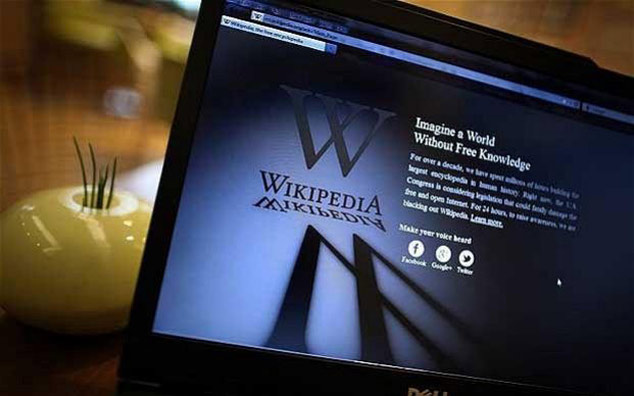|
Wikipedia turns a sexist 15:
Fun, fantastic and incredibly misogynistic
|

Jimmy Wales the Wikipedia founder
CREDIT: TELEGRAPH |
January 15 marked a momentous anniversary for those of us who believe
that the democratisation of knowledge is key to reaching a truly equal
society: it was exactly 15 years since Jimmy Wales launched Wikipedia.
For people who can still remember a time when the automatic answer to
a question wasn't 'Google it', it can seem shocking to take stock of how
our attitude towards information has changed since 2001, when Wikipedia
seemed like a ludicrous idea that would quickly fall into obscurity.
Proving us wrong, the open-sourced encyclopedia is now the seventh
most visited website in the world, with more than five million article
pages and an additional 800 created each day. Devastatingly, it's also
one of the most gender biased entities in the Western world.
According to its own numbers, Wikipedia currently has more than 27
million registered editors, yet studies show that up to 90 per cent of
them are men.
It means that the world's most popular online encyclopaedia has a
worrying male skew - and there are plenty of examples to back it up.
Student Emily Temple-Wood discovered one of the most well-known
instances of sexism on Wikipedia, identifying more than 4,000 female
scientists - including fellows of the Royal Society - who did not have a
page on the site, while obscure male scientists had dozens of paragraphs
written about them.
She created the Women in science page, and has since continued to
work to raise the profile of women in the field on Wikipedia, by drawing
attention to scientists including 18th century astronomer Caroline
Herschel and biologist Lorna Casselton - who were previously not
mentioned.
Even when the articles are there, they are often skewed to reflect
gender imbalances. A study conducted by MIT last year showed that in
pages about women, gender is overly-emphasised, using an unnecessarily
high number of words such as 'female', 'woman' or 'lady'. What's more,
there's often an obvious focus on their 'personal lives' and families -
not always the case in articles about men.
Had it not been for Amanda Filipacchi's discovery is 2013, we may
never have known that female writers were systematically and
intentionally being removed from the 'American Novelists' page and moved
onto a page titled 'American Women Novelists', even though no gender was
mentioned on the page with the male writers.
I can't help but wonder how many other categories have been affected
by similar sexist mentalities - or even unconscious bias - without
anyone noticing.
Misogyny and discrimination
We trust Wikipedia to be - if not always accurate - at least
objective. One might expect misogyny and discrimination on social media
comment boards, about subjects such as Gamergate - which saw developer
Zoe Quinn and other women in the games industry trolled. But we assume
Wikipedia will give us the full story - despite the fact that both sites
are populated by content written in its vast majority by young American
males (the site's largest demographic is 18-29 year old men).
|

Wikipedia: 15 on January 15 |
But when a handful of users edited the Gamergate page to reflect
events from a feminist perspective (as opposed to justifying and
minimising the impact of the online abuse of women in the gaming
industry) they were banned from the site.
Whether this was an intentional act of bias or a genuine mistake is
as murky a question as it is irrelevant. For centuries history books
have been written by men, research has been conducted by men
interviewing other men and talking about what men have done. In a list
of 25 best-selling history books of 2014 only two were written by women.
This leads to fewer biographies and academic works being based on the
influence of powerful female figures, which in turn means that young
women encounter fewer role models to look up to, and are less likely to
pursue careers in politics, science or sport, for example. When the UK
Government threatens to remove feminism from the A-level politics
syllabus (but is forced the backtrack) it becomes blindingly clear that
we've got a problem with female representation in history.
Why, then, are we not jumping at the chance to fix the gender
imbalance where we can: in the most widely-read, accessible and
culturally ingrained information distributor out there? Why are so few
women editing Wikipedia?
(At least, to its credit, Wikipedia has a page about 'gender bias on
Wikipedia').
When the organisation was faced with its shocking gender imbalance
statistic in 2011, it made a pledge to increase its female editor base
to 25 per cent by 2015. Yet most recent studies put the number at 10-15
per cent at best. Jimmy Wales, the most well-known face of Wikipedia,
has admitted publicly that it had been a failure.
Huge sexism problem
Sue Gardner was the executive director of the Wikimedia Foundation
(the non-profit that runs Wikipedia) until 2014.
In an article on her blog, published five years ago, she lists the
nine reasons she thinks women don't edit Wikipedia, including a lack of
time, a generally off-putting atmosphere and less of a predisposition to
battle with a not-particularly-user-friendly interface.
But by far the most poignant and worrying of the suggestions was that
the editing process often involves dispute and confrontation, which
women are less likely to be willing to deal with than men.
This backlash is the reason Lena Dunham has said she no longer checks
Twitter. It's partly why Ellen Pao resigned as CEO of Reddit last year.
Simply, tech spaces have a huge sexism problem.In one of the most
frustrating contradictions of modern times, the internet is both an
incredible vehicle for progress and equality - allowing previously
unheard voices to find a space to share experiences and drive change -
while also being a place of incredible cruelty towards minorities, with
women who speak out mercilessly flooded with abuse and threats.
I have a brother who's 15 years-old. I don't want him to grow up
getting all his information from the same white, stale and male
perspective that's always been prevalent.
We will never have an internet that treats women with respect until
we prove that we're willing to fight for it.
Wikipedia should be our first step in sharing our perspective and
proving the importance of female voices - present and past - online.
(This article was originally published in Telegraph
UK) |

